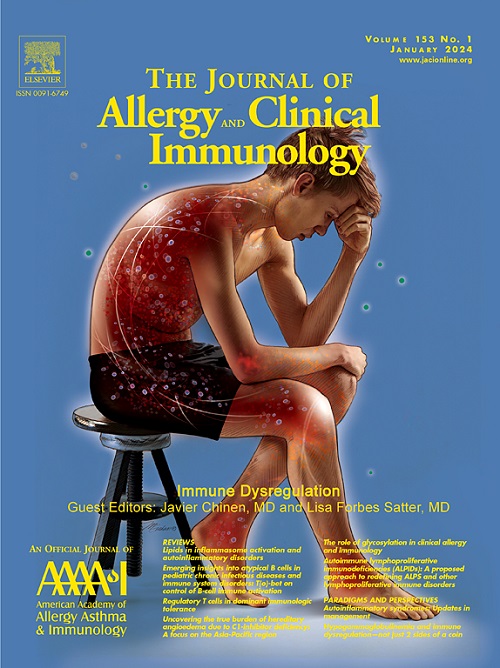Analysis of human neutrophils from nasal polyps by single-cell RNA sequencing reveals roles of neutrophils in chronic rhinosinusitis
IF 11.2
1区 医学
Q1 ALLERGY
引用次数: 0
Abstract
Background
Chronic rhinosinusitis with nasal polyps (CRSwNP) is characterized by type 2 (T2) inflammation. Recent studies, including our own, suggest that neutrophils are also elevated in T2 nasal polyps (NP) and that elevated neutrophils display an activated phenotype. However, the actual roles of neutrophils in NP pathogenesis in T2 CRSwNP are still largely unclear.
Objective
To reveal the roles and heterogeneity of neutrophils in NP tissue by single-cell RNA sequencing analysis.
Methods
We developed a novel microwell-based single-cell RNA sequencing assay using granulocyte-enriched samples from 5 control sinus tissues, 5 NP tissues and patient-matched peripheral blood (PB) samples. This approach allowed for examination of differential expression of genes in NP neutrophils by the Benjamini-Hochberg algorithm and predicted the overall function of NP neutrophils by pathway and Gene Ontology enrichment analyses.
Results
After performing all quality control steps, we successfully detected neutrophils. We identified 333 downregulated and 128 upregulated genes in NP neutrophils (1,151 cells) compared with all PB neutrophils (13,591 cells) (>1.5-fold, q < 0.05) and found commonly dysregulated genes in NP neutrophils compared with both all PB and control sinus tissue neutrophils (3,136 cells). Commonly downregulated genes in NP neutrophils were associated with the innate immune system, and upregulated genes were associated with nuclear factor-κB signaling, cytokine activity, and cellular response to oxygen-containing compounds. NP neutrophils displayed 4 clusters revealing potential heterogeneity of neutrophils in NP tissue.
Conclusions
Elevated neutrophils in NP tissue appear to exist in several subphenotypes that may play important pathogenic roles in CRSwNP.
通过单细胞 RNA 测序分析鼻息肉中的人类中性粒细胞,揭示了中性粒细胞在慢性鼻炎中的作用。
背景:慢性鼻炎伴鼻息肉(CRSwNP)的特点是2型(T2)炎症。最近的研究(包括我们自己的研究)表明,T2 型鼻息肉(NPs)中的中性粒细胞也会升高,而且升高的中性粒细胞显示出活化的表型。然而,中性粒细胞在 T2 CRSwNP 的 NP 发病机制中的实际作用在很大程度上仍不清楚:通过单细胞 RNA 序列(scRNA-Seq)分析揭示中性粒细胞在 NP 组织中的作用和异质性:我们开发了一种新型的基于微孔的scRNA-Seq测定(BD Rhapsody平台),使用了来自5个对照鼻窦组织(CT)、5个NP组织和患者匹配外周血(PB)样本的粒细胞富集样本。这种方法可通过本杰明-霍奇伯格算法检测NP中性粒细胞中基因的差异表达,并通过通路和基因本体(GO)富集分析预测NP中性粒细胞的整体功能:结果:经过所有质量控制步骤后,我们成功检测到了中性粒细胞。与所有 PB 中性粒细胞(13,591 个细胞)相比,我们在 NP 中性粒细胞(1,151 个细胞)中发现了 333 个下调基因和 128 个上调基因(>1.5 倍,qConclusions:NP组织中中性粒细胞增高似乎存在几种亚型,它们可能在CRSwNP中发挥重要的致病作用。
本文章由计算机程序翻译,如有差异,请以英文原文为准。
求助全文
约1分钟内获得全文
求助全文
来源期刊
CiteScore
25.90
自引率
7.70%
发文量
1302
审稿时长
38 days
期刊介绍:
The Journal of Allergy and Clinical Immunology is a prestigious publication that features groundbreaking research in the fields of Allergy, Asthma, and Immunology. This influential journal publishes high-impact research papers that explore various topics, including asthma, food allergy, allergic rhinitis, atopic dermatitis, primary immune deficiencies, occupational and environmental allergy, and other allergic and immunologic diseases. The articles not only report on clinical trials and mechanistic studies but also provide insights into novel therapies, underlying mechanisms, and important discoveries that contribute to our understanding of these diseases. By sharing this valuable information, the journal aims to enhance the diagnosis and management of patients in the future.

 求助内容:
求助内容: 应助结果提醒方式:
应助结果提醒方式:


